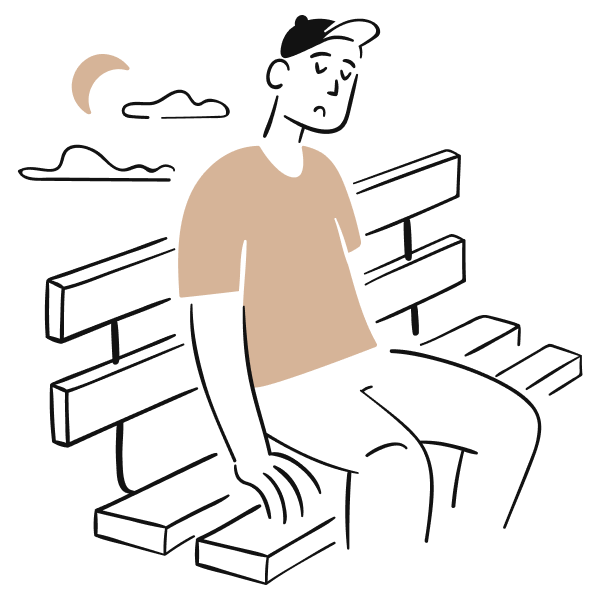Symptoms of PTSD
The symptoms of PTSD sometimes resemble the symptoms of other disorders. So how do you know if you’re suffering from PTSD? What are the signs of post-traumatic stress disorder and how can you tell the difference between chronic post-traumatic stress and acute stress disorder?
How Do You Know If You Have PTSD?
When you have post-traumatic stress disorder, you keep reliving a distressing moment from your past over and over again. For example, this could be in the form of nightmares or flashbacks. It’s the result of something you’ve experienced; an event that left a mark on your life. Re-experiencing unpleasant memories from the past is the most typical sign that someone has PTSD. It’s also this act of reliving that triggers other symptoms. Read more about the causes of PTSD.
There are, of course, many symptoms associated with post-traumatic stress disorder. Some people may suffer from depression or burnout, for example. But how do you tell the difference between PTSD and other conditions?
What Are the Symptoms of PTSD?
The symptoms of PTSD fall into one of four categories:
Re-experiencing
You keep thinking back to the intense, shocking or disturbing event that caused your trauma. You don’t want to think about it, but the intrusive thoughts keep showing up. Sometimes the anxiety you feel is so real it’s as if the event is happening all over again. Symptoms associated with re-experiencing:
- Intense anxiety.
- Increased heart rate or palpitations.
- Rapid breathing.
- Excessive sweating.
- Nightmares that force you to re-experience the event.
Avoidant behaviors
When you’re trying to stop re-experiencing an event, you may develop avoidant behaviors. You’re trying to stay away from anything that could serve as a reminder. This could include places, but also people and topics of conversation. Basically, you’re trying to avoid anything that might make you think about the distressing event and trigger memories of the trauma.
Negative feelings
You may feel overwhelmed by negative thoughts and feelings. You’ll lose interest in the things you used to love. You may even start to feel numb and emotionally detached. For example, you might start to feel less emotionally connected to other people. You’ll feel like a stranger to yourself and others. Other symptoms that fall under this category are:
- Feelings of shame.
- Feelings of powerlessness.
- Being overprotective towards your children.
Excessive irritability
Excessive irritability is the fourth and final group of symptoms associated with PTSD. This irritability manifests itself as insomnia, temper tantrums, and a reduced ability to concentrate. You’re easily startled and constantly on the lookout for danger.
In addition to these groups of symptoms, it’s also possible that you’ll turn to self-harm or abusing drugs and alcohol.
Symptoms of Complex PTSD
Complex PTSD has some additional symptoms, on top of the ones you’d usually have with PTSD. Complex PTSD occurs when you are severely traumatized, or traumatized over a long period of time. It’s possible that, in addition to the previously-mentioned symptoms, you’ll also experience:
- A feeling of no longer being consciously present in moments of intense stress (this is known as dissociation).
- Abruptly fluctuating from one emotion to another, without any control.
- Having low self-esteem.
- Finding it hard to trust other people.
Help
Are you reminded of your own symptoms while reading about PTSD? Would you like to know if you have post-traumatic stress disorder? Then it might be a good idea to speak to your physician or a psychologist. A psychologist can help you recover from PTSD.
-
Do you have questions about treatments? Call us on +31207717996 and we will give you personal advice and help creating a treatment plan.
-
At iPractice, we use blended care. This is a combination of online and offline therapy. You’ll have face-to-face conversations with a consulting psychologist and you’ll also have access to an online psychologist in between. This means that you can ask questions and share your thoughts whenever you like.


 Nederlands
Nederlands




